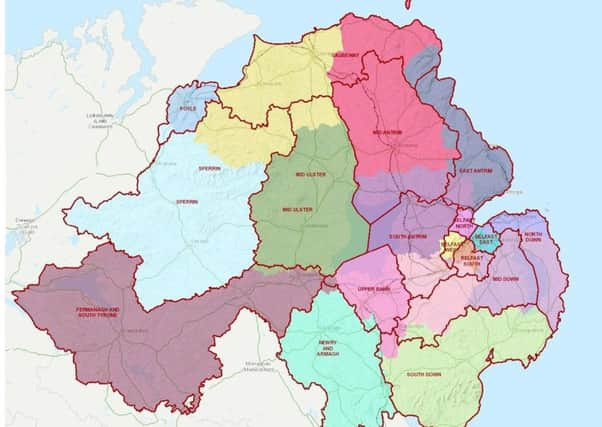Plans to redraw NI’s electoral constituencies deemed ‘unfair’


Mr Justice McCloskey identified the legal flaw in the Boundary Commission for NI’s final recommendations.
He said the decision making process was “vitiated by procedural unfairness, as the common law right of all consultees to have their views considered fully and conscientiously and on the basis on a level playing field was frustrated”.
Advertisement
Hide AdAdvertisement
Hide AdThe verdict represents victory for a Belfast man who brought a judicial review challenge to the Commission’s proposals.
Plans published last September will see the number of parliamentary seats cut from 18 to 17, as part of a wider move to reduce MPs at Westminister from 650 to 600.
But unlike earlier proposals which involved Belfast dropping to three constituencies, the city is to retain four seats under the final recommendations.
Lawyers for the man claimed the Commission has acted unlawfully and unfairly.
Advertisement
Hide AdAdvertisement
Hide AdDescribed as “a constituent affected by the changes to the electoral boundaries proposed by the Boundary Commission”, he was given anonymity in the case.
The planned constituency shake-up provoked political controversy, with Sinn Fein criticising changes they claim would leave a number of constituencies without any nationalist representation.
Central to the legal challenge is a rule within the relevant legislation which allows the Commission to deviate from a 5% range of the UK electoral quota when considering constituency size.
Counsel for the man taking the case argued that the authority had shifted away from its provisional recommendations by relying on the rule without a proper legal basis.
Advertisement
Hide AdAdvertisement
Hide AdHe claimed the Commission had suddenly changed direction in a radical way.
Lawyers for the body under challenge insisted changes to the proposals were in response to “a healthy and procedurally correct consultation process”.
However, Mr Justice McCloskey held that the Commission had fettered its discretion by failing to fully consider consultation responses received in the final stage of the statutory process it had followed.
A further hearing next month will decide on the final remedies and order in the case.
Advertisement
Hide AdAdvertisement
Hide AdOutside court the man’s lawyer, Eoin Murphy of O’Muirigh Solicitors, said: “The significance of parliamentary boundaries for representation at the highest level of our democracy is obvious.
“Once the recommendations are adopted, they will be difficult if not impossible to change for at least the next election, which may affect how individual constituents are represented for several years.”
Mr Murphy stressed that the case was his client’s only option for challenging the proposals.
“Given the very significant effects of any legal error on the part of the Commission, and the essentially irreparable nature of those errors, the court quite correctly exercised an intense level of scrutiny and arrived at the correct conclusion that the Commission had fallen into legal error and acted in a procedurally unfair way.”